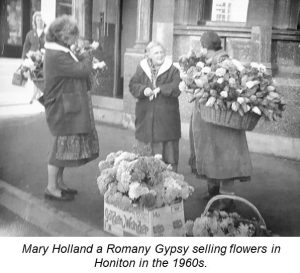What Multicultural History?
by Jess Huffman, Project Coordinator (Honiton), Telling Our Stories, Finding Our Roots
I really enjoy talking to people about the Telling Our Stories, Finding Our Roots Project. Discussing project opportunities to explore diverse and multicultural histories, and watching people’s faces light up as they begin to think of their own family history and heritage is illuminating.
But on a number of occasions the response has been, “The project sounds great, but does Honiton have a multicultural history?”
I revel in my reply. Often pausing before I begin to list just some of the stories we hope to follow up as part of the research.

A Place of Rest and Refuge
- It turns out that very little of Honiton’s Romany Gypsy community has been recorded, despite them having lived in this area for generations. Their ancestors are buried in the local churchyards, and the family names remain familiar because many still live here today.
- Few realise that last year marked 50 years since the arrival of more than 1800 Asians from Uganda to Honiton’s Heathfield camp.
- We think Honiton may have been a place of refuge as far back as the 1930s when camps were set up for Basque children refugees from the Spanish Civil War. Shortly after this they were used to house Polish soldiers, airmen and sailors who had escaped the German and Russian invasions in 1939. Again, descendants of these men and women still live here, and it turns out an old school friend is a granddaughter!
- In more recent times of course we have seen Honiton and the surrounding villages sign up to provide a safe, welcoming home for people arriving from Ukraine as a result of the conflict.
All the World in one Place
- Many have seen the red-robed monk outside the Dolphin Hotel on market day. I wonder if people passing realise he lives just a few miles from town in a Buddhist Monastery that for the last 25 years has served as a sanctuary for a small community of monks and novices practising in the Theravada tradition?
- A stone’s throw from the Monastery is the home of the Twelve Tribes community, a religious movement that sprang out of Chattanooga, Tennessee in the 70s. Made up of individuals from all around the world, they run the local Yellow Deli Cafe and sell bread and sweet treats on the market each week.
- They aren’t the only ones who have brought delicious dishes from other parts of the world. For 23 years, a local Turkish family has brought us glasses of sweet Turkish tea and, for the daring, Raki (Lions milk). At the other end of town, traditional Indian and Himalayan food is cooked by a professional Nepalese chef, himself a Gurkha. The Gurkhas, soldiers in the British Army, were traditionally recruited from the hill people of Nepal, and can trace their roots right back to an 8th century Hindu warrior.
- Work is still commonly the reason why people move to a place and we have seen a growing number of skilled workers from Africa and Asia moving to Britain and to Honiton to relieve the crippling staff shortages within our care system.
This is why projects like this one, that look to embrace cultural diversity, are so important. Together, as a community we can begin to unearth the patchwork of stories that help us to value everyone who makes up our community and recognize the important contribution they offer.
Be a part of the Story for a More Inclusive Future
If you would like to find out more about this exciting new project, you can find me every Wednesday at the Honiton Library between 10am – 12pm.
Plus, everyone is welcome to join us for our informal Project Launch on Wednesday 29th November 4- 6pm at The Beehive Community Centre.
It’s a chance to find out more about the project, its aims and ambitions. Maybe you are interested in our volunteering opportunities? Maybe you have a story to tell, or know someone who has? Everyone is welcome, so join us for a drink and something to eat. Be part of the story.

